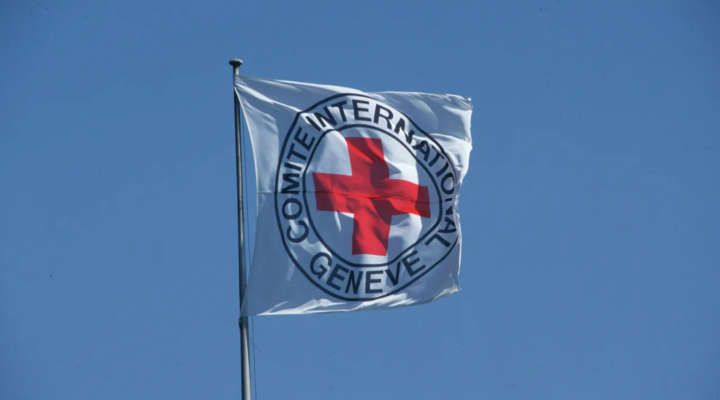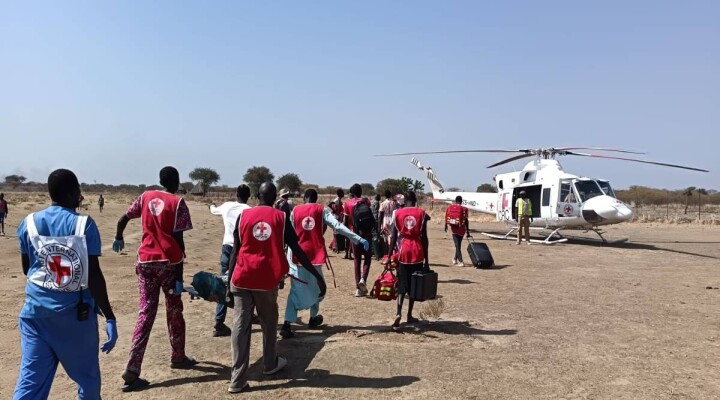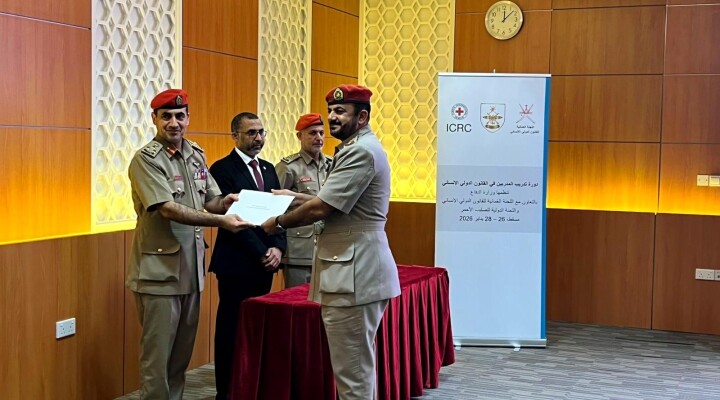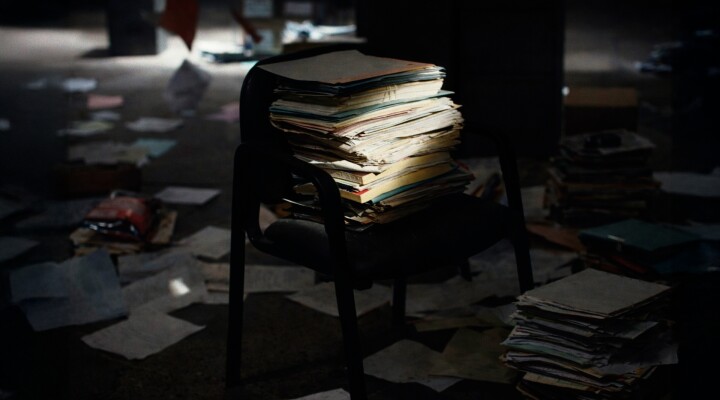Nigeria: 2 million displaced people hit hard as prices soar
People who fled their homes and lost their livelihoods due to the ongoing conflict in the North-East of Nigeria struggle to put food on the table because of soaring inflation. The inflation rate reached a four-year record high of 18per cent in March this year, according to the National Bureau of Statistics. People displaced by the conflict are among the most vulnerable and are disproportionally affected by price fluctuations.
“Before the prices of things were acceptable. Since they increased, everything has become expensive. And since I sell my merchandise in the camp, I know these people are displaced, the price cannot be the same, as I have to take their situation into consideration,” says Ali Kolomi, who has been displaced with his family of nine, and now runs a grocery shop in one of the camps for displaced people in Maiduguri, the capital of Borno state
Over a decade of armed conflict has left more than two million people displaced in the North-East of Nigeria, making it one of the world’s most complex humanitarian emergencies. As people fled their homes, they also lost their livelihoods and many of them struggle to meet their essential needs.
“Beyond the physical safety, people also have steadily and increasingly been struggling securing basic livelihood. Families struggle to find work, care for their loved ones, but also put food on the table.” said Sarrah El Moumouhi, deputy head of Maiduguri sub-delegation for the International Committee of the Red Cross (ICRC).
According to official statistics, 40 per cent of Nigeria’s population, or almost 83 million people, live below the country’s poverty line of 137,430 naira ($382) per year. The ICRC provides microeconomic grants to vulnerable groups of people who lost their income due to the ongoing armed conflict to enable people to start small businesses. However, steep inflation of the past year has hit them hard and an increasing number of people are struggling to keep their business afloat.
Aisha Umar, a widowed mother from Borno State, has been living in Bakassi camp in Maidiguri for the last seven years, following an attack that left her and her eight children displaced. In 2019, she received an ICRC microeconomic grant. Prior to the power outage that affected the city for the past six months, Aisha sold ice. Electricity shortage has raised the price of ice and she can no longer afford it. As a result, Aisha like many other people who relied on electricity for their businesses, have had to find another source of income.
“Nowadays, to avoid spending the money that I have left, I buy smaller animals to keep the investment going,” said Aisha Umar. “If I buy rams at 30,000 ($75) or 40,000 naira ($100), I can sell them at 60,000 ($145) or 70,000 naira ($170). Then, I deduct the cost of feeding them and I use the rest of the amount to pay for the children’s schools.”.
In 2020, more than 16’000 people received cash for investment through the ICRC’s micro-economic grants and 173 entrepreneurs received grants through the ICRC-Tony Elumelu Foundation partnership to start their own businesses.
Note to editors - Available for interview:
Sarrah El Moumouhi ICRC Deputy Head of Sub Delegation, Maiduguri, Nigeria
For further information, please contact:
Alyona Synenko, Nairobi, +254 716 987 265, asynenko@icrc.org
SHOTLIST
Location: Maiduguri, Nigeria
Length: 6.01
Format: mp4
Camera: Kolawale Adewale
Copyright: ICRC access all
On Screen Credit: ICRC or Logo
00.00 -- > 00.17
Various shots of city streets.
00.17-- >00:32
Interview: Aisha Umar – Livestock Trader, Bakassi IDP Camp, Maiduguri.
“Nowadays, if I buy rams at 30,000 or 40,000 naira, I can sell them at 60,000 or 70,000 naira. I deduct the cost of feeding them and I use the rest to pay for their schools. To avoid spending the money I have, I buy smaller animals to keep the investment going.”
00.32-- > 00.47
“That’s what is helping me to keep the children at school. I don’t have any relatives, and no one has ever given me anything even an Ankara. Even my younger brother, he was the only one helping us, but he is no longer with us.”
00.47-- >01.11
“Life is like that, I don’t get any help, the children only rely on me to make the capital, although it’s only 200,000 naira. The money has started to reduce since I have to pay the bills, education, health, and clothes. One of my children got sick, I spent 50,000 naira on her alone.”
01.11-- >02.12
Various shots of Aisha Umar feeding her livestock (sheep and chicken).
02.12-- >02.19
Wide shot of market.
02.19 --> 02.24
Shot of Ali Kolomi’s Market stall.
02.24 --> 02.29
Shot of Ali Kolomi sitting in his market stall.
02.29 --> 02.34
Shot of bags of cereals.
02.34 --> 03.16
Various shots of Ali Kolomi working in his market stall.
03.16- - >03.31
Interview: Ali Kolomi – Grain Trader, Bakassi IDP Camp, Maiduguri.
“Initially, I enjoyed the business because the product was very cheap to buy. Nowadays, the price of the products is escalating, and it has become expensive.”
03.31- - >03.47
“There is no money and people are running out of cash. You have to put the needs of other people before your own. Everyone is out of cash and the price of each product has increased now.”
03.47- - >04.01
“I used to buy maize on credit from the custom market and I would return the money after I had sold the maize.”
04.01- - >04.20
“Previously the price of the product was acceptable. Since it has increased, we have to buy it at an expensive rate. And since we sell it in the camp, we know they are IDPS, the price cannot be the same since we take their situation into consideration.”
04.20- - >04.33
“If you go to the market, you realize how much the prices have increased. An item that used to sell at five hundred Naira now sells at six hundred Naira”
04.33- - >04.45
Interview: Sarrah El Moumouhi – ICRC Deputy Head of Sub Delegation, Maiduguri.
“The northeast of Nigeria has suffered continuous conflict and insecurity for over a decade now. This means that the people, individuals, families and communities have also suffered the consequences of this situation.”
04.45- - > 04.59
“But beyond the physical safety, people also have steadily and increasingly been struggling securing basic livelihood. Families struggle to find work, care for their loved ones, but also put food on the table.”
04.59- - > 05.07
“The most vulnerable groups also suffer even greatly. We are talking about children, women and persons with special needs.”
05.07 - -> 05.20
“Talking to families all over the northeast in places like Maiduguri, like Monguno, Bama or Gwoza; families talk about the difficulty they have to access basic needs such as basic healthcare services or education.”
05.20 - - > 05.33
“People talk about having lost access to their farming land or having lost the ability or the resources to farm their lands as before. People have also lost access to markets and trading areas.”
05.33 - - > 05.54
“Today the strategy of the ICRC is to continue exchanges and conversations with communities, authorities but also other humanitarian actors on the ground, to find sustainable ways to help communities restore the dignity they once had by restoring their livelihoods.”
05.54- - >06.21
Various shots of Sarrah El Moumouhi working in her office.
ENDS



